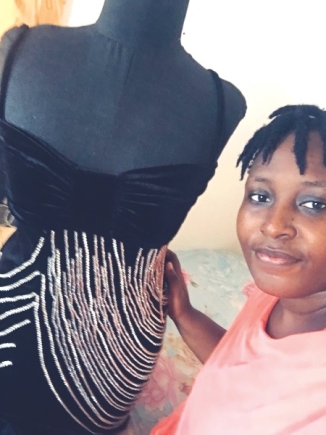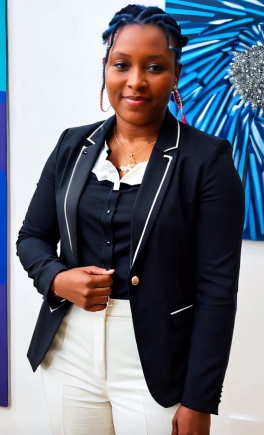He was a familiar face, one of the many customers who bought from her mother during her trading days in second-hand goods at Awoshie in Accra. So, when he asked her to follow him home so he could settle a supposed debt, she didn’t think twice. She was already out running errands of collecting debts for her mother anyway.
Her phone had also gone off, so she couldn’t confirm if this man, whose name was not on the list of debtors, indeed owed her mother.
Once inside the room, she sat down, waiting while he got the supposed money, only to come back with a relationship proposal. When she refused, he turned violent, defiled her and threw her outside.
“I screamed, but no one heard me. He twisted my arm, bit me and forced himself on me, and I bled,” 25-year-old Sarah Rabiatu Ibrahim recalled in an interview with The Mirror last Wednesday, 10 years after the incident.
Her goal is to join the many voices in creating awareness and fighting abuse of any form. She said she had now found the courage to speak out for the first time.
Miss Ibrahim said she went home bleeding and injured, changed out of her bloody clothes, throwing them away. When her mother later asked about her injuries, she lied, saying she had fallen.
“The next day, I found the courage to confide in a woman who treated me like her daughter. That woman, a doctor, took me to the Anyaa Police Station, Awoshie, and reported the crime,” she said.
Miss Ibrahim said that during the years that followed, life became a fight for survival, journeying through miscarriages, suicide attempts and abandonment.
Background
Miss Ibrahim was born in Accra to a Christian mother, Agnes Esi Agyeiwaa and a Muslim father, Ibrahim Issaka. She was a student of the Beseaj Academy at Awoshie, where she had her basic education and continued to the University Practice Senior High School (SHS), where she studied Home Economics.
“My dream has always been to go into the medical field, but the financial means were absent. While my mother was a single parent, my father only existed,” she noted. As such, she said that she could not continue her education after SHS.

Aftermath of the defilement
After being defiled, Miss Ibrahim noted that a medical examination proved that indeed she had been defiled, and the report was given to the police.
She said that the perpetrator, Paul Nana Poku, who was in his 20s at the time, was arrested and arraigned before a High Court in Accra.
“I was in school when I got a call that scared me and made me cry; while being transported to court for his third hearing, Paul escaped. He was not handcuffed and opened the car door, and ran off at a traffic stop,” she said.
According to Miss Ibrahim, the police made no efforts to find him, and Poku’s parents claimed they had no idea of his whereabouts.
She added that there were no follow-ups, no extra confrontation with his family and no effort to reopen the case.
“I doubt if the police report or anything about the case still exists,” she said.
“The whole incident happened when I had just finished Junior High School and was waiting for financial support to go to SHS. I eventually got a scholarship, so I left for school. I was in school when the court proceedings started. After the escape, I had no one to rely on to follow up on the case so I had to give it up, focus on school and try to move on,” she said.
A marriage that couldn’t hold
Finding herself married at the age of 20 was not part of Miss Ibrahim’s plans.
“I got married out of necessity because I thought it was my way out. Soon after SHS and following a trivial disagreement with my younger sister, my mother kicked me out of the house. I was 18 and had nowhere to go,” she said.
The man I was working for, who eventually proposed marriage, offered me shelter in an extra room in his office.
“At the time, he was my only source of support. Knowing my story, he made me feel comfortable and assured me that he was on my side and had my best interest at heart, which made the idea of marriage feel logical, so I agreed,” she recalled.
She noted that a customary marriage ensued, but the marriage started shaking when children were not forthcoming.
“It was one miscarriage after the other; the first at eight weeks, the second at seven months and the third at five months and doctors could not immediately explain the losses,” she said.
She added that, initially, they said it could be due to the Rhesus factor, her husband was positive while she was negative.
Miss Ibrahim noted that after the third miscarriage, however, the Rhesus factor suspicion was ruled out.
She explained that another obstetrician-gynaecologist (OB-GYN) said it could be that she had an incompetent cervix, a condition where the cervix is too weak to stay closed during pregnancy, leading to miscarriage or pre-term delivery.
The OB-GYN also noted that the cause could be attributed to the defilement.
“I was told if I could conceive for the fourth time, they would stitch the entrance of the cervix until I was ready to deliver,” she said.
Miss Ibrahim noted that her husband, much older than her, had already met someone else who could give him children.
“I was happy for him, thinking we could still keep trying now that he had a child outside, but he had other plans — he wanted to move on, that was about two months ago,” she added.
Carrying the weight
“Years of trauma have left me with emotional scars, severe low self-esteem, fear of judgement and recurring depression. I have attempted suicide many times,” she said.
The worst, she recalled, was when she tried to drink pesticide, but someone walked in just in time.
“I have cried and cried and cried, feeling hopeless, dejected and weak. I don’t know if I’d ever try again to have children or even marry again; the trauma is just too much. I feel like no one will accept me and will stigmatise me. I don’t even go anywhere,” she noted.
Therapy has been of help to Miss Ibrahim, except that she hasn’t been able to afford sessions recently.
Survival through craft
Despite her fears, Miss Ibrahim expresses the hope to start afresh while healing. She is an apprentice with the Auris Fashion Centre learning how to make beads.
“I want to learn it well so I can create beaded bags, accessories and beaded fashion pieces. Maybe I can go back to school, but now I need to gain some level of financial stability,” she said.
She added that she now lives with her trainer at Spintex in Accra.
She dreams of becoming an advocate, raising awareness, supporting other survivors and speaking up for others.
Justice, too, remains a lingering hope for Miss Ibrahim.
“I still wonder, what if I had the right legal support?”, What if someone had cared enough to keep fighting, what if I hadn’t given up?”
Writer’s email:appreygloria@gmail.com

